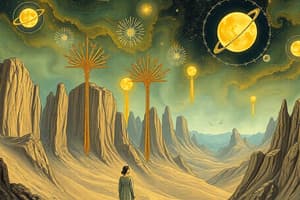Podcast
Questions and Answers
What is the composition of the universe in terms of Cold Dark Matter, Baryonic Matter, and Dark Energy?
What is the composition of the universe in terms of Cold Dark Matter, Baryonic Matter, and Dark Energy?
Cold Dark Matter: 24%, Baryonic Matter: 4.6%, Dark Energy: 71.4%
The universe's expansion is explained by Hubble's Law.
The universe's expansion is explained by Hubble's Law.
True (A)
What is the estimated age of our Solar System?
What is the estimated age of our Solar System?
4.6 billion years ago
The first stars and galaxies formed approximately ____ after the Big Bang.
The first stars and galaxies formed approximately ____ after the Big Bang.
What is a quasar?
What is a quasar?
Light travels at a speed of 150,000,000 m/s.
Light travels at a speed of 150,000,000 m/s.
Which theory was proposed in 1948 and is now discredited?
Which theory was proposed in 1948 and is now discredited?
Name the period that follows the inflationary epoch in the early universe.
Name the period that follows the inflationary epoch in the early universe.
Early universe was about __% Hydrogen and __% Helium.
Early universe was about __% Hydrogen and __% Helium.
What is the fate of the universe?
What is the fate of the universe?
Flashcards are hidden until you start studying
Study Notes
Core Subject Overview
- Focuses on understanding Earth on a planetary scale, including its history and composition.
- Discusses geological processes and issues related to Earth's resources.
Composition of the Universe
- Cold Dark Matter: 24% of the universe; has gravity but does not emit light.
- Baryonic Matter: 4.6% of the universe; consists of atoms forming stars, planets, and galaxies.
- Dark Energy: 71.4% of the universe; drives the observed acceleration of the universe's expansion.
Star Formation
- Stars originate from gravitational collapse of gas and dust in clouds, evolving from protostars.
- Remaining material can form planets, asteroids, or other celestial bodies.
Galaxy Structure
- A galaxy is a collection of billions of stars.
- Clusters of galaxies form superclusters with largely empty space in between.
Creation Myths
- Numerous cultural narratives explain the universe's origins including:
- Ancient Egyptians believed in a world emerging from a vast sea.
- Kuba people tell of a creator god who vomited celestial bodies.
- Indian mythology describes the sacrifice of a primal man leading to the creation of the cosmos.
Scientific Paradigms
- Historical ideas about the universe's origin range from Creationism to scientific theories like the Big Bang.
- Theories evolve with accumulating evidence and discoveries.
Big Bang Theory
- Originates around 13.7 billion years ago; the universe began from a single point of energy.
- The universe continues to expand, and hydrogen and helium formed shortly thereafter.
Misconceptions of the Big Bang
- No explosion occurred; rather, the universe is continually expanding from the initial singularity.
- Before the singularity, there was no matter, energy, or space.
Evidence for the Big Bang
- Universal expansion observed via Hubble’s Law; galaxies are moving away, with farther galaxies receding faster.
- Cosmic Background Radiation provides a uniform static noise across space supporting Big Bang predictions.
- Quasars represent extreme galactic cores, found far from Earth.
Radiometric Dating
- Utilizes radioactive decay to determine the age of materials, such as moon rocks which are older than Earth.
Stellar Observations
- Star life cycles are monitored with satellites and telescopes, documenting their formation, evolution, and explosion.
- Speed of light is a constant; distances in space are measured in light-years, where 1 light year ≈ 9.5 trillion kilometers.
Theoretical Models
- Steady State Theory: Discredited view suggesting continuous matter creation to maintain density as the universe expands.
- Oscillating Universe Theory: Combines the Big Bang and Big Crunch, indicating a cyclical universe.
- Inflationary Universe Theory: Exponential expansion post-Big Bang lasting a tiny fraction of a second, leading to slower expansion due to dark energy later.
Multiverse Concept
- Hypothesizes a collection of universes, all with their own physical laws and constants.
- Each universe within the multiverse can be considered a separate realm of existence or alternate realities.
Questions on Universe's Fate
- Explores whether the universe will continue to expand indefinitely or eventually collapse under gravity.
Studying That Suits You
Use AI to generate personalized quizzes and flashcards to suit your learning preferences.



